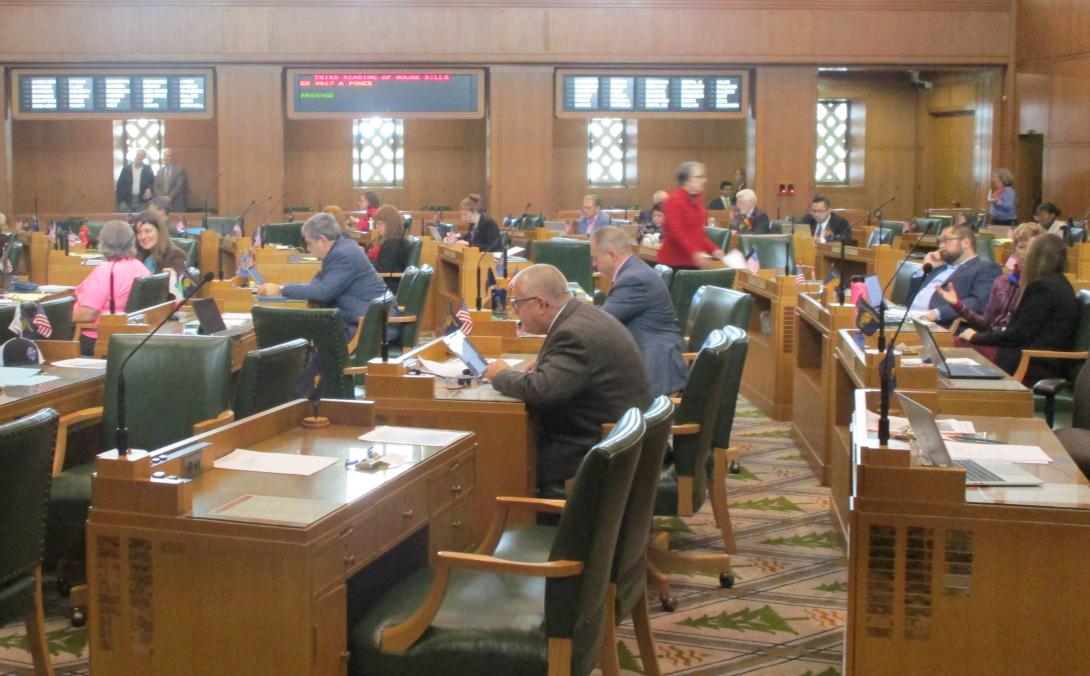
Health care workers and other essential workers would get one-time payments of up to $2,000 as a reward for their willingness to continue on the job during the pandemic, under a bill in the Oregon Legislature.
House Bill 3409 would give the money to workers in the health care industry and other essential fields, including law enforcement, transportation and logistics, and food and agriculture work, who faced risks as they continued to show up during the pandemic. The bill would use an estimated $450 million from federal COVID-19 recovery funds Oregon is receiving under the American Rescue Plan Act.
The bill would set up two types of payments. One would give up to $2,000 to workers who stayed on with employers during the pandemic. No payments would go to anyone who earned more than $82,500 in base pay last year.
The other type of payment would be return-to-work incentive cash for currently unemployed essential workers who start new jobs after June 30.
"A lot of essential workers are low paid or not very well paid, and many of them their employers didn't compensate them very well,” said Rep. Rob Nosse, D-Portland, one of the chief sponsors of the bill. “It’s a way to say ‘Thank you’ and recognize the work and the risk that they took.”
The bill was sent to the Rules Committee and still needs a vote to move forward for a floor vote, as the Legislature enters the waning days of the session.
The two other chief sponsors are Rep. Rachel Prusak, D-Tualatin/West Linn and chair of the House Health Care Committee; and Rep. Andrea Valderrama, D-Portland.
The bill has 25 other regular sponsors. They are primarily Democratic lawmakers, but include three Republican legislators: Reps. Kim Wallan of Medford and Jack Zika of Redmond; and Sen. Tim Knopp of Bend.
Many Health Workers Could Benefit
Unions and other groups that represent health care and other front-line workers widely support the bill.
“Frontline workers risk their own health and safety to keep Oregon running,” said Lynda Pond, a registered nurse and president of the 15,000-member Oregon Nurses Association. “Starting our recovery with essential workers shows we care about the people who care for us. Essential worker pay puts Oregon’s working families first.”
The effect of the bill on health care workers would be mixed. Many, such as experienced registered nurses, earn more than the program’s proposed ceiling. However, many other hospital workers, such as certified nursing assistants, food service workers and cleaning staff, would likely qualify for the aid. Health care workers in the long-term care homes, such as nurse aides and home health care workers, would also likely benefit due to their low pay.
The bill sets out the workplace circumstances that would make the worker eligible for the money, for example being in regular close physical proximity to others, such as employees, customers or patients.
The bill is being pushed by labor unions across all industries in Oregon. Front-line workers muscled freight on loading docks, stocked grocery store shelves, delivered packages and kept hospitals open -- all while coming into regular contact with the public.
“Since the beginning of the pandemic, Oregon’s essential workers have carried us through uncertain and challenging times,” said Graham Grainor, president of the Oregon AFL-CIO, which represents more than 300,000 workers in the state across different industries. “And since the beginning of the 2021 Oregon Legislature, Oregon’s unions have demanded that these same essential and frontline workers, who are often disproportionately workers of color and women, have the safety, respect, and compensation they deserve. It is well past time to stand with those who have not just stood by us, but have done so while making an extraordinary sacrifice.”
The bill was introduced this week in the Legislature. Under the bill, an employee would be eligible for the retention bonus of up to $2,000 if they worked at least 520 hours during the pandemic. That includes paid time off to quarantine because of COVID-19 symptoms or exposure.
The bill would allow the state to take into consideration factors in each worker’s application such as their wages and the risk of their industry’s exposure to COVID-19, as determined by the workplace regulators.
Payment Phased Out For High Earners
For the full $2,000, a worker would need a base pay equal to or less than the state average wage in 2019, which was about $55,000. A worker could still qualify for $1,000 if they earned up to 150% the state average base wage, or $82,500.
Meanwhile, out-of-work employees who start new jobs would be eligible for a one-time “return to work incentive” payment of $1,200 if they meet certain criteria. These include: First, they would need to be unemployed as of June 30 and have received unemployment benefits for at least one week since March 8, 2020. They also would need to complete four weeks of continuous employment with a covered employer by Oct. 15.
The workers who receive the return-to-work incentive could not have received any other payments through the program.
The Oregon Department of Business and Consumer Services would develop programs to handle the applications. Employers could apply for payments for employees who were laid off during the pandemic. Employees could also apply separately.
A spokesperson for House Speaker Tina Kotek, D-Portland, didn’t respond to a request for comment.
You can reach Ben Botkin at [email protected] or via Twitter @BenBotkin1.